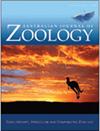Denning behaviour of female spotted-tailed quolls during the breeding season
IF 1
4区 生物学
Q3 ZOOLOGY
引用次数: 1
Abstract
Abstract. We monitored some aspects of maternal care in Australia’s second largest extant marsupial predator, the spotted-tailed quoll. We radio-collared six females carrying young at an early pouch stage in the Byadbo Wilderness in southern New South Wales in August–September 2016. When these young were deposited at a maternity den at a still altricial state we monitored den activity of the female and her young with motion-triggered camera traps. Lactating females remained in the same den for up to 39 days before moving to a new den, usually only a few hundred metres away. Females furnished dens with nesting material, but were never observed to carry prey nor were the young seen consuming solid food. They were also surprisingly tolerant towards visits and den use by wombats, rabbits, possums and male quolls. Females showed predominantly nocturnal activity, but usually returned at least once per night. Short daytime activity was also common. In contrast, juveniles were initially exclusively diurnal, probably to facilitate behavioural thermoregulation, and only later extended their playing and exploring towards dawn and dusk. Hence interactions between mother and young were rarely observed. Apparently, the young received little training from their mother and simply ventured further and for longer periods away from the den until independence.雌性斑尾鼬在繁殖季节的觅食行为
摘要我们监测了澳大利亚现存的第二大有袋类食肉动物——斑点尾袋鼬的母性护理的一些方面。2016年8月至9月,我们在新南威尔士州南部的Byadbo荒野中,用无线电项圈捕捉了六只在育儿期早期携带幼崽的雌性。当这些幼崽在冬眠状态下被放置在母性洞穴中时,我们用动作触发相机陷阱监测雌性和她的幼崽的洞穴活动。哺乳期的雌性会在同一个洞穴里待上39天,然后搬到一个通常只有几百米远的新洞穴。雌性为巢穴提供筑巢材料,但从未被观察到携带猎物,也没有看到幼鸟吃固体食物。它们对袋熊、兔子、负鼠和雄性袋鼬的造访和巢穴也出奇地宽容。雌性主要在夜间活动,但通常每晚至少返回一次。短时间的日间活动也很常见。相比之下,幼崽最初只在白天活动,可能是为了促进行为体温调节,后来才延长了它们的玩耍和探索时间,直到黎明和黄昏。因此,很少观察到母子之间的相互作用。显然,幼崽们几乎没有从它们的母亲那里得到什么训练,只是冒险走得更远,离开巢穴的时间更长,直到独立。
本文章由计算机程序翻译,如有差异,请以英文原文为准。
求助全文
约1分钟内获得全文
求助全文
来源期刊
CiteScore
2.40
自引率
0.00%
发文量
12
审稿时长
>12 weeks
期刊介绍:
Australian Journal of Zoology is an international journal publishing contributions on evolutionary, molecular and comparative zoology. The journal focuses on Australasian fauna but also includes high-quality research from any region that has broader practical or theoretical relevance or that demonstrates a conceptual advance to any aspect of zoology. Subject areas include, but are not limited to: anatomy, physiology, molecular biology, genetics, reproductive biology, developmental biology, parasitology, morphology, behaviour, ecology, zoogeography, systematics and evolution.
Australian Journal of Zoology is a valuable resource for professional zoologists, research scientists, resource managers, environmental consultants, students and amateurs interested in any aspect of the scientific study of animals.
Australian Journal of Zoology is published with the endorsement of the Commonwealth Scientific and Industrial Research Organisation (CSIRO) and the Australian Academy of Science.

 求助内容:
求助内容: 应助结果提醒方式:
应助结果提醒方式:


